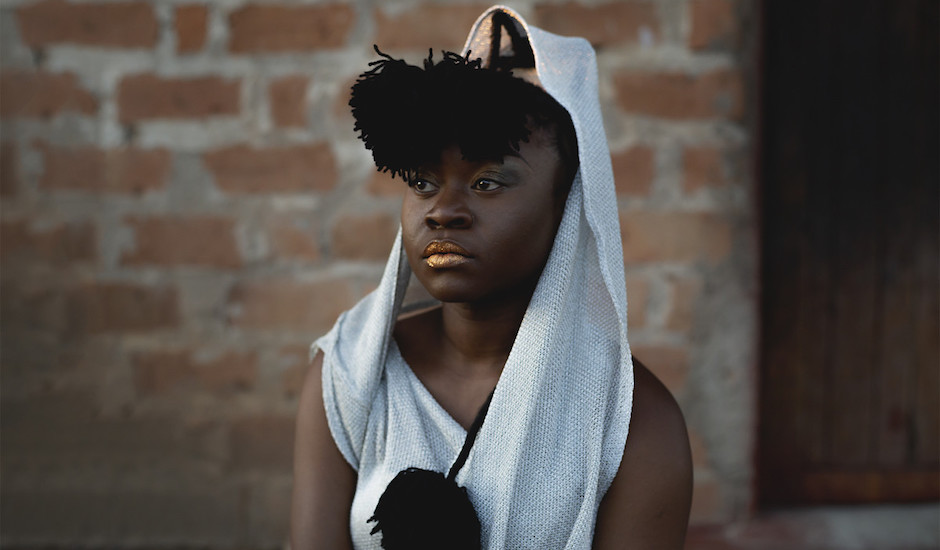 "It's a little jarring": Mac DeMarco wants to make you think twiceOn his new album, Here Comes the Cowboy, Mac DeMarco is stepping outside of the box. Catch him on tour this January.
"It's a little jarring": Mac DeMarco wants to make you think twiceOn his new album, Here Comes the Cowboy, Mac DeMarco is stepping outside of the box. Catch him on tour this January.

Storytelling with Sampa The Great: "I'm going to show you who I am."
On her debut album The Return, the Zambian musician sets her narrative straight - with some of the year’s best music.
Photos by Barun Chatterjee.
It’s Friday, September 13th – the day Zambian-born musician, rapper and poet Sampa The Great shares her debut album – and a small strip of Melbourne’s Fitzroy has become hers.
Beginning as an intimate performance and record signing at local hip-hop record store Northside, a crowd quickly swells onto both sides of the street and the event becomes something bigger: a celebration of home and community, plus the culture that rises when the two intersect. Fans mix with Sampa’s close friends and collaborators – REMI’s Sensible J, Jace XL – while chants echo off the buses as they drive by, shouts of “black power!” and adlibs of ‘ayys’ and ‘oohs’ ricocheting as drum breaks and dancing rhythms fall around them.
For Sampa, however, home is 12,000 kilometres away in Zambia, and to say anything but is rewriting a narrative she’s spent the last two years meticulously rebuilding. “A lot of what we see assume about the artist becomes the story of the artist,” she told The Sydney Morning Herald in 2018, the month after her mixtape Birds and the BEE9 won the coveted, Mercury Prize parallel Australian Music Prize. Now, over a year later and three weeks before she’d come to shut down the streets she’s now living within, Sampa – real name Sampa Tembo – is telling her own story. “Until we tell the story ourselves, it will be told for us.”
The Return, Sampa The Great’s long-winding debut album, re-amplifies her narrative and course-corrects the assumptions made about her in the past, from throwaway comments in press – it’s not uncommon to find Sampa labelled an ‘Australian musician’ in media – to the microaggressions (and overt displays of aggression, unfortunately) you’d expect a black woman to face working in a country and industry controlled by the opposite. “It's four or five years into my career in Australia, and I think it was getting to a point where people were like ‘you're with us now’,” Sampa says, taking a break from signing records. “To me, it was getting to a point where I had to say 'I live in Australia, but I just told you where I'm from and where I grew - and that’s not Australia.’”
Eventually, it felt like The Return was an album that had to be made to address this, giving Sampa the opportunity to readjust her narrative and set her story straight. “As it continued being a thing, it got to a point where I wanted to tell this narrative - this story - for myself, because at the end of the day, it is a human being behind the music and the art, and I am from Zambia - not Australia,” she continues. “A lot of my first professional experiences have been from Australia, but as far as where I'm from and where my culture stems from, that's something you can't put aside at your leisure because it doesn't fit into the narrative you want to put it in.”
So, faced with the task of showing her story and from where she grew, Sampa went to the place where it all began - Zambia. Faced with a sense of imbalance after releasing Birds And The BEE9, the visit home aided in connecting that bridge between where Sampa grew and where she’s based professionally, taking the empire she has built in Australia and bringing it back to the community and culture that shaped her today - even performing live in Zambia for the first time as a part of the visit. “It was like a completion of a journey,” she says.
When she returned, she came back feeling more self-assured and balanced; ready to tell the story and write her narrative through The Return’s sharp lyricism and percussive bounce. “If I'm going to tell the story, I'm going to go home myself and show you videos of the schools I went to, the people that are hanging out around, my parents, my home, and the story behind Sampa The Great,” Sampa explains. By doing this, she’s able to take command of her narrative, and do so in a way that would capture the energy, the culture and the heritage that shape the album’s drive. “You can do whatever you want with that story, but I create the narrative and I control the story.”

The Return, in many ways, is an undisturbed message from Sampa that tells of her glow-up and sets her story straight. It takes us to where she grew - such as within the walls of the school in Botswana she attended growing up - and who she grew up around, from traditional Nyau dancers lining the streets to her own family, who feature heavily within The Return’s 19 tracks. Her mother and sister, for example, sing in their language, Bemba, on the album’s opening track, Mwana. “Wwana wandi ikala panshi ndi naiwe,” they sing. “I’m with you, sit down, I’m always with you, you don’t have to search for an element that is within yourself,” Sampa translates.
Elsewhere, above rhythms and grooves which dance between funk, soul, R&B and hip-hop, Sampa The Great tells stories that define her story and make her reckoning clear. Album highlight OMG flexes Sampa’s culture as clapping percussion and chanting shouts meet visuals including both her Botswana-based parents, while Leading Us Home, a song Sampa admits she’d “never thought she could make”, sees her lead a choir of voices that sing with a gentle R&B groove: “Love leading me to myself, I'm like the only home that I ever left,” she sings as a reminder to never lose her self-balance again.
On Final Form, however, a song whose accompanying video has drawn comparisons to visuals of Beyoncé and Kendrick Lamar for its richness, this overarching theme of home and everything it encompasses becomes its most realised. Within, traditional Nyau dancers in feathered masks and headdresses dance amongst clips of tapping feet and moving arms, while dancers join Sampa in chanting the same post-chorus chanted back in Melbourne: “Black power!” they shout. “The music video for Final Form was inspired by the belief of having a spiritual exodus back to yourself,” she said with its release. “Often, as black people in the diaspora, we talk about the physical return to our roots but not as much about the spiritual. Final Form is meant to start that conversation.”
Homesickness is a horrible thing. It can leave you feeling imbalanced and unwell at its worst, with a lingering feeling of longing for home and what that encompasses, such as familiarity in both the community and its culture. For those in the diaspora, scattered away from their home and their culture in search typically of safety or ‘success’ in western, often-white countries, this homesickness isn’t uncommon. For Sampa The Great, this homesickness - longing for Zambia and her family at home - inspired her to look inwards, exploring what home specifically is as she separates it from its physical meaning, dissecting the idea of home itself and this longing you can feel towards it.
“I feel like as my career has grown here, there's still lingering homesickness that has come with it as well, and I found that I was not being content with all the amazing things that were happening in my career because I really wanted to go home,” Sampa explains. This feeling is eventually what led to a thought - a line of questioning - that would come to shape The Return and its overarching theme: home, and what that means. “Feeling that way brought the topic of what home is,” she says. “What is home to the people around me? What is home to myself? I thought about the people I have in my community – some of them being people who can't go home. Once I delved into what home is, that opened up this whole world for me.”
At the end of the day, Sampa The Great just wants you to question what home is to you, and how you interact with it. “This record isn’t just about my story, or even the diaspora - how I experience my life personally,” she says. “I want people to re-evaluate what home is full-stop, because at the end of the day, that home - that safe haven - is actually yourself and everything that you take with that: the culture, the people, the community, the food, and so on.
The spiritual sense of who you are is what we're talking about here. Your body is a home in itself, to your soul.”
Sampa The Great's debut album The Return is out now via Ninja Tune. Catch her on tour this October - tickets available now.
Follow Sampa The Great: FACEBOOK
 "It's a little jarring": Mac DeMarco wants to make you think twiceOn his new album, Here Comes the Cowboy, Mac DeMarco is stepping outside of the box. Catch him on tour this January.
"It's a little jarring": Mac DeMarco wants to make you think twiceOn his new album, Here Comes the Cowboy, Mac DeMarco is stepping outside of the box. Catch him on tour this January.
 Searching for clarity and climate justice with Caroline PolachekOn Pang, Caroline’s first solo album under her own name, the former Chairlift member attempts to feed a hunger.
Searching for clarity and climate justice with Caroline PolachekOn Pang, Caroline’s first solo album under her own name, the former Chairlift member attempts to feed a hunger.